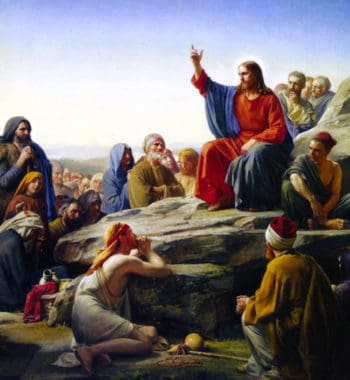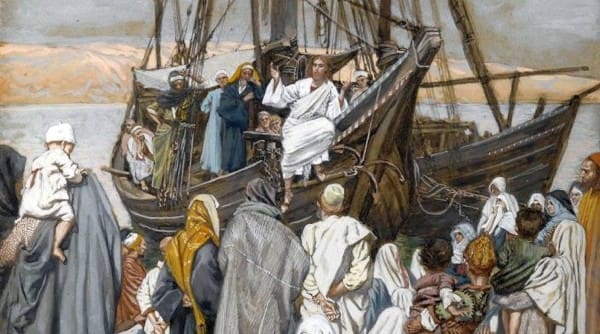What is God’s Will?
Part I of II: His Indicative Will
Hungering for God’s Will
Dear Father John, Since I came back to the Church, I recognize my mistakes in following God’s will for me. Now, I want nothing more than to do His will. But, I’m not really sure what it is. How do I know what is God’s will for me?
JESUS IS THE center of every authentically Christian life. Loving God with all our heart, soul, mind, and strength means loving Jesus more and more and more, because Jesus is God-become-man, God-with-us. And loving Jesus means following him, learning from him, obeying him, becoming more like him, and letting him be our strength and salvation, as he continually invites us to do:
Come to me, all you who labor and are burdened, and I will give you rest. Take my yoke upon you and learn from me, for I am meek and humble of heart; and you will find rest for your selves. For my yoke is easy, and my burden light. (Matthew 11:28–30)
What Made Jesus Tick?
 If the spiritual life is, in its most basic elements, nothing less than following Christ and imitating him—and that is precisely how St. Paul summed it up: “Be imitators of me, as I am of Christ”
If the spiritual life is, in its most basic elements, nothing less than following Christ and imitating him—and that is precisely how St. Paul summed it up: “Be imitators of me, as I am of Christ”
(1 Corinthians 11:1)—then Christ’s deepest desire should be our deepest desire. During his life on earth, his very food, the thing that he hungered for and the thing that nourished and strengthened him, was “to do the will of the one who sent me” (John 4:34). So central was this idea to his life and teaching that he placed it at the very heart of the one prayer that he taught us, the Our Father: “This is how you are to pray: Our Father in heaven, hallowed be your name, your kingdom come, your will be done, on earth as in heaven…” (Matthew 6:9–10, emphasis added).
What Is God’s Will?
The Father’s will—finding it, accepting it, and carrying it out with love—was the rule for Christ’s life, and so it should be the rule for the life of every Christian. And indeed, if we make this our food, as Jesus did, then our heart, soul, mind, and strength will find themselves fully engaged in our task of loving God, because the essence of love is union, becoming one with the beloved.
God’s will is his wise and loving project for the full flourishing of all his creatures, especially those of us created in his own image and likeness. By striving to identify with that project in the here and now of our daily lives, we become co-workers in bringing it to completion. What greater love could we show him than that? And what more direct way could we find to achieve the purpose for which we were created? This is why Jesus, who modeled perfectly the love and purpose we are called to pursue, hungered and yearned “to do the will of the one who sent me” (John 4:34). As he explained to his persecutors: “I cannot do anything on my own…. I do not seek my own will but the will of the one who sent me” (John 5:30).
But the phrase God’s will can be abused. People have distorted it to justify irresponsible passivity in the face of evil, self-centered and damaging manipulation of others, and exaggerated asceticism. We need to unpack the term so we can better understand what Jesus wants and better unite ourselves to him. Breaking down the concept into two broad sub-categories will help avoid confusion. From our human perspective, God’s will can be either indicative or permissive.
God’s Indicative Will
 God can indicate that he wants us to do certain things. This is his indicative will (as opposed to his permissive will, the things he permits to happen without actually commanding them…). God’s indicative will always flows from his wisdom and his love. In other words, whatever he wants us to do is for our greatest good. In this category we find the Ten Commandments, the commandments of the New Testament, the commandments and teachings of the Church, the responsibilities of our state in life, and specific inspirations of the Holy Spirit. If we want to know God’s will for our lives, those are the places we need to start.
God can indicate that he wants us to do certain things. This is his indicative will (as opposed to his permissive will, the things he permits to happen without actually commanding them…). God’s indicative will always flows from his wisdom and his love. In other words, whatever he wants us to do is for our greatest good. In this category we find the Ten Commandments, the commandments of the New Testament, the commandments and teachings of the Church, the responsibilities of our state in life, and specific inspirations of the Holy Spirit. If we want to know God’s will for our lives, those are the places we need to start.
The field of God’s indicative will is vast. It touches all the normal activities and relationships of every day, which are the arenas where, through our choices, we grow in virtue or in vice, thus deepening or dampening our communion with God. It also includes the endless possibilities of the works of mercy (feeding the hungry, instructing the ignorant, comforting the sorrowful, etc.), by which we carry out our Lord’s commandment to “love your neighbor as yourself” (Mark 12:31).
Going Even Deeper
Yet God’s indicative will not only consists of what we do, but also in how we do it. This opens up another path of growth in Christian virtue, most especially the theological virtues. We can wash the dishes (responsibilities of our state in life) with resentment and self-pity, or with love, care, and  supernatural joy. We can attend Sunday Mass (the third commandment and a commandment of the Church) apathetically and reluctantly, or with conviction, faith, and attention. We can drive to work (responsibilities of our state in life) seething at the traffic jams, or exercising patience. When we ask ourselves, “What is God’s will for me?” 88 percent of the time (more or less), God’s indicative will is crystal clear: lovingly follow the commandments, lovingly carry out our daily responsibilities, and look for practical ways to love our neighbors as God has loved us. To seek, accept, embrace, and fulfill this will for our lives is the surest way to engaging our heart, soul, mind, and strength fully in loving God.
supernatural joy. We can attend Sunday Mass (the third commandment and a commandment of the Church) apathetically and reluctantly, or with conviction, faith, and attention. We can drive to work (responsibilities of our state in life) seething at the traffic jams, or exercising patience. When we ask ourselves, “What is God’s will for me?” 88 percent of the time (more or less), God’s indicative will is crystal clear: lovingly follow the commandments, lovingly carry out our daily responsibilities, and look for practical ways to love our neighbors as God has loved us. To seek, accept, embrace, and fulfill this will for our lives is the surest way to engaging our heart, soul, mind, and strength fully in loving God.
Much of the Church’s tradition of spiritual teaching is dedicated to exploring the implications of and the reasons behind these indicative commandments; the more thoroughly we understand them, the more of our heart, soul, mind, and strength we can put into obeying them. And that obedience is the path to the wisdom, peace, and fulfillment we yearn for—what Jesus referred to as blessedness: “Blessed are those who hear the word of God and observe it” (Luke 11:28).
Editor’s Notes:
- In part II, we will examine the second aspect of God’s will: God’s permissive will.
- This is another excerpt from Father John Bartunek’s new book “Seeking First the Kingdom” filled with “practical examples and down-to-earth wisdom which will show you how to bring Christ into each facet of your life”. Click here to learn more about the book…or if you wish to get it for a friend or relative who doesn’t read on line.
Art: The Sermon on the Mount, Carl Heinrich Bloch, 1877, Restored Traditions, used with permission. “Les tables de la Loi” (The Tablets of the Law), Stained glass window in Alsace Synagogue, Alsace Museum of Strasbourg, end of 19th century, Ji-Elle own work, CCA-SA; Detail from Canonization ceremony of Brazilian Friar Frei Galvão celebrated by Pope Benedict XVI at the Campo de Marte, in Sao Paulo, Brazil, Fabio Pozzebom/ABr, 11 May 2007, CCA; both Wikimedia Commons. Feature Image: Jesus Preaches in a Ship, between 1886 and 1894, James Tissot, PD-US author’s life plus 100 years or less, Wikimedia Commons.


